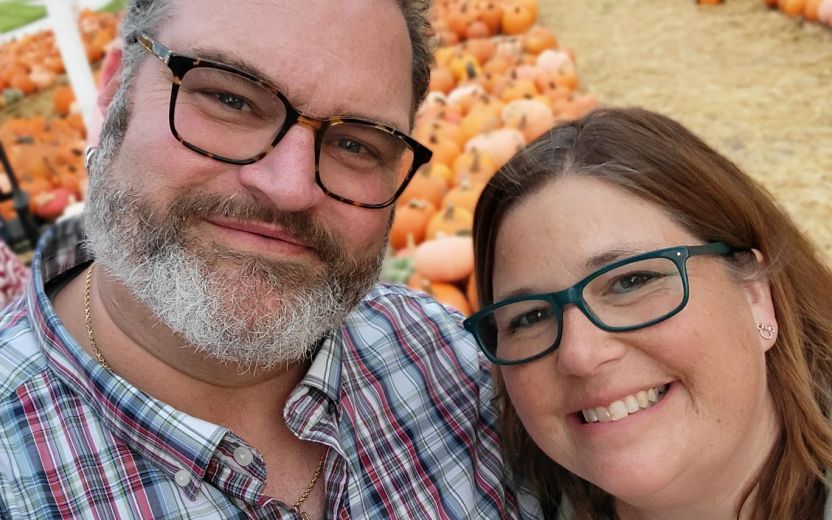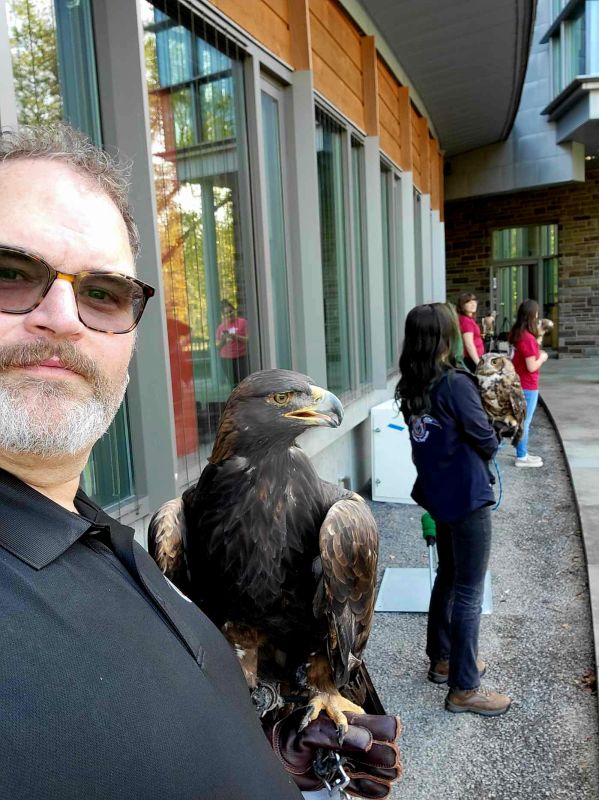Wellbeing Takes Flight: Suzanne and Woodg Horning and the benefits of birding

Finding a hobby that you enjoy can have positive results for your health. Here’s how one Cornell staff couple enhances their wellbeing with a hobby they discovered together: birding.
After arriving in the area in 2000, Suzanne, (who is Associate Director for Cornell Commitment and Coordinator of The Cornell Tradition), and William "Woodg" Horning, (a Director of the Office of Academic Diversity Initiatives and Director of NY State Opportunity Programs), happened across the Lab of Ornithology bird cams - and their interest in raptors took flight.
Recently recovered from cancer, Suzanne was looking for an activity she could do outdoors. “After years of studying the development of humans, I learned of the live-streamed red-tail hawk nest on campus and was fascinated by the successful parenting behaviors of the pair of hawks, Big Red and Ezra, on the Weill nest,” recalls Suzanne. She and Woodg began taking walks up Tower Road observing the mated pair in action – gathering sticks for nesting material, hunting, and once their eggs hatched, watching them teach the fledglings. “Once you start to “look up” it’s hard to stop because you realize how much you have been missing,” Suzanne notes.
This sparked an interest in learning more about other birds in the area. “Making these observations brought us outside in the fresh air, getting exercise and finding other people who were just as excited and invested in birds,” Suzanne says. What they love best about birding is how it allows you to leave the pressures of everyday life behind. “Birding requires you to focus on what is happening in the sky and to leave whatever stress, worries, etc. you have on the ground, “ Suzanne says. “You don’t need any kind of equipment to get started! You can just walk outside!”
After attending a summer program offered by the Cornell Raptor Program and spending time with additional raptors up close and personal, they connected with Dr. Heather Huson, director of the Cornell Raptor Program and an alum of Cornell Tradition. They immediately began supporting and volunteering with the program, which houses approximately 35 non-releasable birds of prey that serve as ambassadors for their species. The program gives participants, primarily undergraduate students, an opportunity to get hands-on experience in the daily care of raptors and share educational programming on campus and in the community. Woodg notes, “Working with the raptors requires you to be present in the moment and leave everything else at the door. Being in a room with a bird of prey that is faster than you requires your attention to make sure both you and the bird remain safe and have a good and positive experience.”
In addition to making their physical and mental wellbeing a priority, the two have formed lifelong friendships and gained followers all over the world. They began carrying a camera with them on their adventures and now share photos of the campus hawks and other local raptors they encounter with others, encouraging them to get outside in nature. You can often find the Hornings, eyes upward, on campus or surveying local birding hot spots year-round. “We are stuck between four walls too much with our heads in the computer screen! No matter what color you paint your office, nothing is as pretty as outside” Suzanne says.
by Amy Layton, Cornell Work/Life

